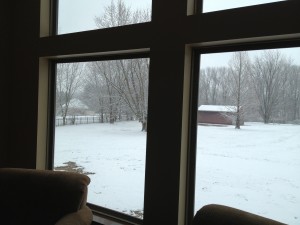 I had to chuckle this week witnessing the weather watchers worry as snow “threatened” the East Coast. Said NYC Mayor Bill de Blasio prior to the snowstorm, “This could be a storm the likes of which we’ve never seen before.” To his credit, de Blasio was only following the lead of the National Weather Service, which labeled the coming snow as “life-threatening” and “historic.” In preparation, travel was banned and the subways were shut down. However, upon completion of the precipitation, “life-threatening” and “historic” equated to less than a foot of snow for New York City. The forecasts (and rhetoric) failed to match the actual results.
I had to chuckle this week witnessing the weather watchers worry as snow “threatened” the East Coast. Said NYC Mayor Bill de Blasio prior to the snowstorm, “This could be a storm the likes of which we’ve never seen before.” To his credit, de Blasio was only following the lead of the National Weather Service, which labeled the coming snow as “life-threatening” and “historic.” In preparation, travel was banned and the subways were shut down. However, upon completion of the precipitation, “life-threatening” and “historic” equated to less than a foot of snow for New York City. The forecasts (and rhetoric) failed to match the actual results.
Hence, the headlines from the day after…
- “Did New York Overreact to the 2015 Blizzard?” — The New York Times
- “The Blizzard That Wasn’t” — Canada Free Press
- “Overreaction or Justified Caution?” — The Guardian
- “Mayor Defends New York Snow Warning” — BBC
- “Politicians Can Never Win With Weather” — The Atlantic
Let’s acknowledge that Mayor de Blasio — unless he has meteorology credentials unknown to the Intramuralist — was undoubtedly basing his decision to shut down the city on the weather expertise of others. As NY Gov. Andrew Cuomo said in response to some of the immediate questions and criticism, “This is an imprecise science.” Smart as we are, controlling and predicting the weather with absolute certainty on all occasions is not only an imprecise science; it is also not within man’s capability.
So why? … what causes the unquestionably obvious overreaction by leadership? Note: the NYC subway has never been closed for snow before; this was less than a foot. The precautions taken were unnecessary. So the question is: what motivates the precaution?
Again, de Blasio, etal. had to rely on someone else for their meteorological expertise. However, it seems to this semi-humble current events observer that another factor was huge in the consideration of how to best prepare. I speak not of anything weather related… nothing about snow… nothing about any tangible, physical storm.
I speak instead of the litigious storm that too often swells when someone faces negative circumstances. We live in a culture where when bad things happen to good people, good people find someone else to blame. Someone has to be held responsible.
It’s as if in all of our maturity and growth, an area where we are culturally ignorant is that we are incapable of accepting negative circumstances. And so if we are incapacitated, impaired, or even inconvenienced, we look first to blame someone else, as opposed to accept a less than desirable circumstance. We blame others for negative circumstances.
In New York City, for example, if it actually had ended up snowing 17 feet, maybe I blame the city if my street isn’t plowed fast enough… if my power goes out… or if I get stuck in some dark and semi-dingy subway. Instead of accepting a frustrating circumstance, I simply blame the city.
Hence, the Mayor and the Governor decided to be proactive… not just in case of the potential snow, but also in case of the potential, accompanying liability. Did they overreact? Yes. “Better safe than sorry,” was the rhetorical refrain.
Do we ever overreact to negative circumstances? We most certainly do.
Respectfully…
AR
